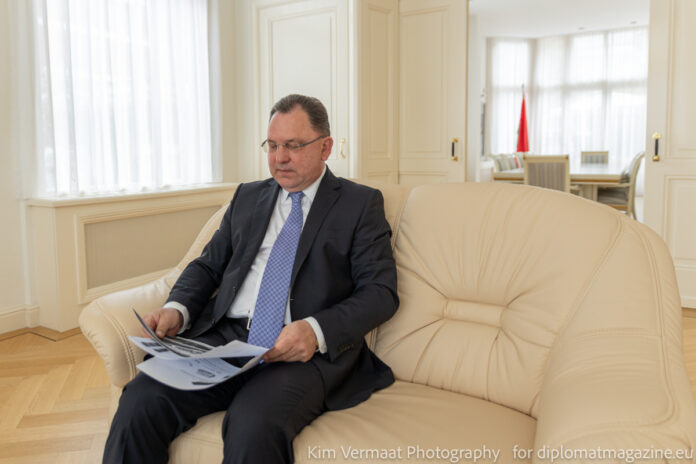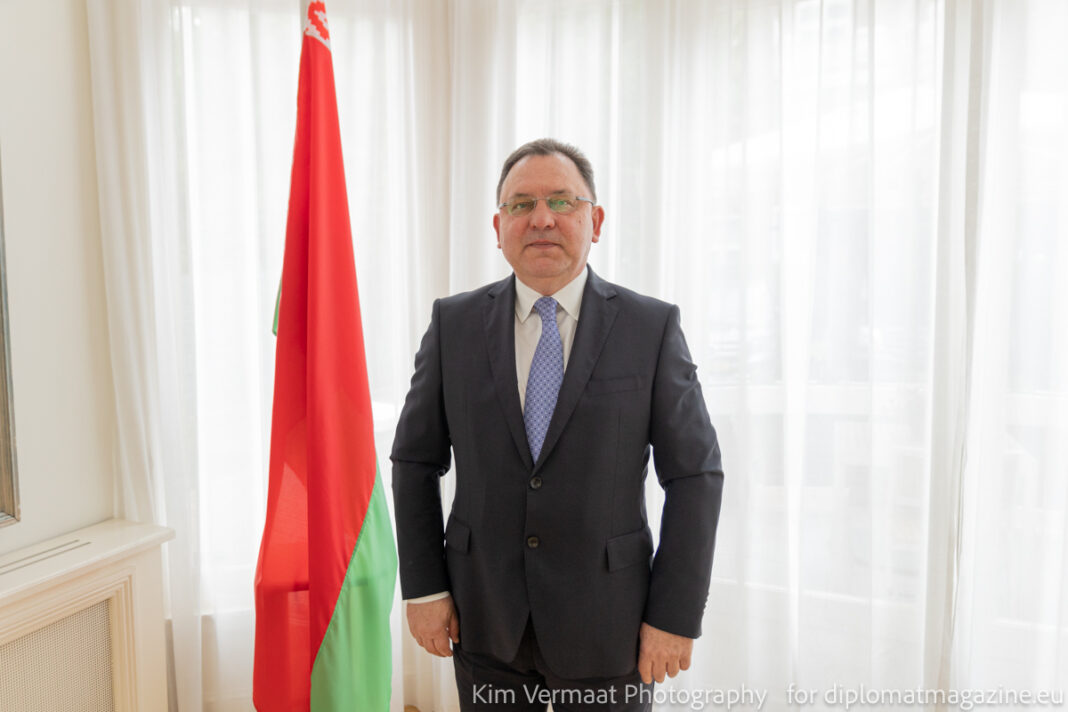By H.E. Ambassador Andrei Yeudachenka, Ambassador of the Republic of Belarus in the Kingdom of The Netherlands
“Belarus also offers, unconditionally, its territory as a transit route for Ukrainian grain to reach Baltic Sea ports”
Belarus stands today as the world’s second largest producer of potash, a material integral to the nation’s thriving agricultural sector. The country is renowned for producing high-quality agricultural and dairy products such as butter, cheese, or milk. All in all, Belarus owes its prosperity in part to the use of potash in farming.
A growing concern today is the risk of global famine due to potential disruptions in the supply of Belarusian potash; as fertilizer shortages persist, the threat of food insecurity and severe hunger looms large for millions worldwide.
Statistics from the United Nations World Food Programme reveal that approximately 345 million people across 82 countries are currently grappling with acute food insecurity. This figure is up from 282 million at the end of 2021. Furthermore, up to 50 million people across 45 countries are on the brink of starvation.
Fertilizers are pivotal to achieving global food security. Amidst the ongoing fertilizer crisis, which goes back to a similar situation in the 1970s, the importance of potassium as one of the three primary crop nutrients (alongside nitrogen and phosphorus) cannot be overstated. The absence of these nutrients can potentially reduce crop yield by as much as 50% for certain crops.
JSC Belaruskali, the only producer of potash fertilizers in Belarus and the world’s second-largest potash producer, used to account for 20% of global potash trade. However, due to restrictions and sanctions imposed on Belarusian potash and its sole producer by the US, the EU, and certain EU members, the company’s contribution to global production and export plummeted to 10% by mid-2022. This has led to a global output reduction of 16.3% (or 5.9 million tonnes) and a 20.2% decrease in global exports (or 5.8 million tonnes) compared to the same period in 2021.
Interestingly, other countries, including Russia, have been exempted from these measures due to the humanitarian nature of the commodity. Meanwhile, the demand for potash continues to grow in line with the increasing global population. Due to the lifecycle of potash production, any significant increase in capacity is likely only in Canada, and not before 2025. Thus, neither Canada nor any other country can adequately compensate for the volume of Belarusian potash taken off the market due to these restrictions in 2023 or 2024.
The global food security situation worsens as potash shortages develop, allowing other global suppliers to exploit the situation, inflate prices, and increase profits. This trend consequently places a financial burden on farmers, negatively impacts yields, and contributes to rising food prices.
In light of the significant risk to global food security, Belarus appeals to the international community for assistance in exempting Belarusian potash from these restrictions and restoring unhindered transit of its fertilizers to global markets, including those in Latin America, Asia, and Africa. Belarus also offers, unconditionally, its territory as a transit route for Ukrainian grain to reach Baltic Sea ports.
Belarus believes that ensuring global food security should be a priority for all international actors, including European countries.

A brief overview of Belarus’ economy:
- Belarus is a landlocked country bordered by Latvia (161 km), Lithuania (640 km), Poland (375 km), Russia (1,312 km), and Ukraine (1,111 km). Its terrain is generally flat, characterized by marshlands, a result of glacial scouring which also accounts for the country’s 11,000 lakes. Approximately 43.7% of Belarus’ land is agricultural, with 15.9% designated as permanent pasture (2018 estimates).
- Belarus is characterized by a significant percentage of land dedicated to agriculture (43.7% as of 2018) and a substantial portion allocated as permanent pasture (15.9% in 2018). In fact, the country boasts a wide array of agricultural products, including milk, potatoes, sugar beets, wheat, triticale, barley, maize, rye, rapeseed, and poultry.
- Belarus’ diverse industries range from manufacturing metal-cutting machine tools, tractors, trucks, and earthmovers to producing motorcycles, synthetic fibers, fertilizers, and textiles. The country is also known for its production of refrigerators, washing machines, and other household appliances.
- On the trade front, Belarus has shown a consistent export performance with $49.425 billion in 2021, $37.183 billion in 2020, and $41.975 billion in 2019. The country’s primary export partners include Russia (42%), Ukraine (13%), and the United Kingdom (7%) as of 2019. The leading exported commodities in 2021 were fertilizers, refined petroleum, cheese, delivery trucks, and lumber.
- Concerning imports, Belarus registered $45.459 billion in 2021, $35.236 billion in 2020, and $42.378 billion in 2019, with figures quoted in the respective year’s dollars. The main import partners are Russia (57%), China (7%), Poland (5%), Germany (5%), and Ukraine (5%), as reported in 2019.



